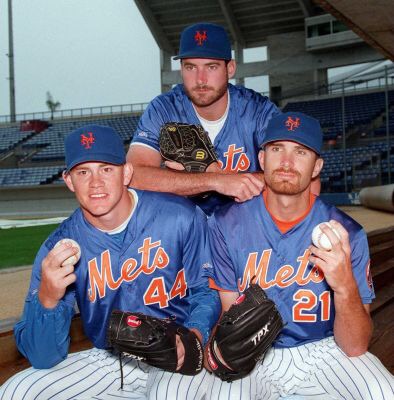The year was 1996. The Mets were supposed to open the season with a trio of pitchers dubbed Generation K. Jason Isringhausen, Paul Wilson, and Bill Pulsipher were all supposed to usher in the next era of great Mets pitching. They were supposed to win multiple Cy Youngs and World Series titles.
It never happened.
Bill Pulsipher
Pulsipher was the first to arrive on the scene. In his first year in AA, a 20 year old Pulsipher pitched 201.0 innings. The prior year he only pitched 139.2 innings. The following year, 1995, Pulsipher would pitch in AAA and get called up to the majors. He threw 218.1 innings. Pulsipher wouldn’t pitch in 1996 as he had a torn ligament in his pitching elbow.
In Pulsipher’s rookie year, he made 17 starts. He never reached that plateau again. His last major league appearance came in 2005 when he was 31 years old. When Pulsipher made those five appearances, it was the first time he pitched in the big leagues since 2001. Pulsipher finished his career going 13-19 with a 5.15 ERA in 46 starts and 60 relief appearances.
Paul Wilson
Unlike Pulsipher, Wilson burst on the scene in 1996. He was the first overall pick in the 1994 draft after dominating at Florida State. In 1995, Wilson pitched his first season of professional ball, and he pitched well in his 186.2 innings. So well in fact, that the Mets called him up to the majors. He went 5-12 with a 5.38 ERA in 26 starts. His season would end as he needed arthroscopic surgery to repair a torn labrum in his pitching shoulder.
Wilson would never pitch for the Mets again. He would be part of a trade on 2000 for a fourth outfielder in Bubba Trammel and a bullpen arm in Rick White. He finished his career going 40-58 with a 4.86 ERA in 153 starts and 17 relief appearances.
Jason Isringhausen
Without a doubt, Isringhausen had the best career of the Generation K pitchers, and he had to go to the bullpen to do it.
Isringhausen burst on the scene in 1995. In 14 starts with the Mets, he went 9-2 with a 2.81 ERA. Even though he only pitched in half a season, he was so impressive that he finished fourth in the Rookie of the Year voting. While he may not have been the most heralded pitcher of Generation K, he had the most success out of all of them when he was first called up. However, that success would not last as like the other two pitchers, Isringhausen’s arm was a ticking timebomb.
In 1994, the year before Isringhausen pitched in the majors, he threw 193.1 innings. The year before? He threw only 90.1 innings. In his career, Isringhausen would need shoulder surgery and three Tommy John surgeries. This doesn’t even include surgery for a broken wrist because he lost a fight with a water cooler.
Isringhausen would eventually make two All Star teams due to his work as a closer. He would record 300 saves. The last seven were with the Mets in 2011 when he came back on a minor league deal. At that point, he served as a mentor to a young bullpen. It was a nice bookend towards the end of his career. The former young hothead with arm troubles became a veteran leader.
Generation K
These three heralded young pitchers were ruined by the Mets organization. They were needlessly pushed beyond their limits in the minors and majors. As a result, they had a series of shoulder and elbow injuries. The heralded trio would never appear in the same rotation.
Epilogue
It’s been four years since Isringhausen has retired, and now people want to interview him when we talk about how prospects should be handled. Here’s what he revealed about how those Mets handled prospects:
Jason Isringhausen: In the minors if we didn't pitch 9 innings, we got a talking to. We didn't watch pitch counts as much as we do today
— MLB Network Radio on SiriusXM (@MLBNetworkRadio) March 3, 2016
Twenty years later, the Mets have a new trio, who for some reason don’t have a great nickname like Generation K. While Jacob deGrom and Matt Harvey have had Tommy John surgery, the Mets handle their young aces much better now. They took better care of their pitchers during the rehabilitation process. Last year, we saw deGrom and Harvey team up with Noah Syndergaard to pitch the Mets into the World Series.
This was supposed to happen 20 years ago. It’s happening now. So next time, the Mets are too patient with a player, or a player or his agent voice concerns over a pitcher’s workload, remember Mets fans were robbed of seeing three aces in one staff due to over usage of the young pitchers.
I’m sure innings limits, six man rotations, and skipped starts will be a story line at some point in 2016. When it does, embrace it because the Mets not using that forward thinking might’ve cost at least one World Series title. Young pitchers are fragile, and they need to he handled as such. If you don’t, the workload could lead to injuries and/or ruined careers. Next thing you know, the window to win a World Series is slammed shut.
I’m not willing to see another chance go by the wayside due to some meaningless starts again.

